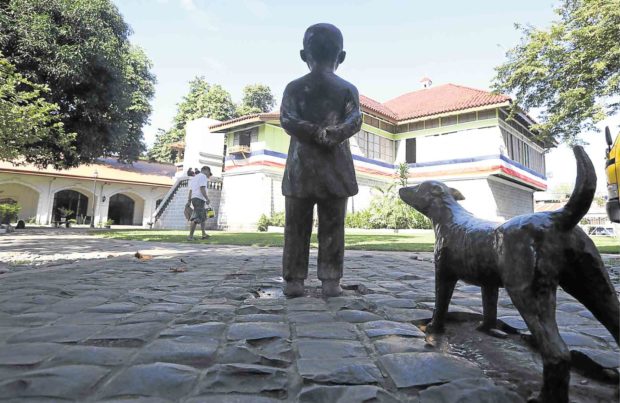
A statue of the young Dr. Jose Rizal at the museum grounds is popular among visitors.
CALAMBA CITY — In his hometown in Laguna province, the memory of national hero Dr. Jose Rizal still reigns despite the rapid urbanization.
The two-story house of Rizal, the remaining physical structure that once belonged to his family, is still Calamba City’s top tourist draw and one of the most visited attractions in Laguna.
The 265-square-meter house, reconstructed in 1950 through the help of National Artist for Architecture Juan F. Nakpil, sits at the center of the old town of Calamba.
Converted into a museum and shrine under the National Historical Commission of the Philippines, it initially featured mementos from the national hero’s birth and childhood.
Later, through the government’s museum modernization program, the house included interactive displays about Rizal’s travels to Europe.
Top attraction
Larissa Malinao, Calamba tourism officer, said local government records showed that more people visited the Rizal house than the resorts in Barangay Pansol, the second most popular attraction here.
In 2016, the city recorded 1,022,631 visitors, of which about 40 percent were museum guests, according to curator Zarah Escueta.
Among frequent visitors are students on educational trips. During holidays, guests include families and foreigners.
Salvacion Geronimo, 63, from Cabuyao City, said she would rather take her 11 grandchildren to the Rizal museum where they could “relax.”
“It’s too tiring to go to the mall. Besides, I’d rather expose them to Rizal’s (life and works) early on,” she added.
Escueta said the Rizal museum used to receive an average of 20,000 guests a month but the number fell to 12,000 a month, after the government suspended school trips following a road accident in Tanay town in Rizal province that killed 15 people, mostly students, early this year.
“The number is just starting to pick up last October after the moratorium (on field trips) was lifted,” she said.
Replica
Unknown to many, the structure made of stone and hardwood is a replica of the 1859 house built two years before Rizal was born.
The only materials salvaged from the original structure were the tiles used on the ground floor and the water well outside the house.
In 1891, the Rizal family was evicted from their home, with the lot confiscated by the Dominican friars.
“Rizal was in Europe at that time. Like an OFW (overseas Filipino worker), he was really bothered knowing he couldn’t do anything for his family here,” Escueta said.
In 1889, as the Spanish colonial era came to an end, the house was sold to Don Isidro Cailles, a former governor of Laguna, for P27,000.
Student actors use the Rizal house in Calamba City for a photo shoot depicting events in the national hero’s life. —PHOTOS BY MARIANNE BERMUDEZ
Quezon’s plan opposed
Cailles turned it into a “tenement,” dividing it into nine partitions, until years of neglect led to its collapse.
In 1938, Commonwealth President Manuel Quezon wanted a monument of Rizal built on the 3,740-sq-m property.
“But the people of Calamba protested. The idea to rebuild the house actually came from the people,” Escueta said.
From the Rizal shrine, a stone’s throw away is the St. John the Baptist parish church, where Rizal was baptized on June 22, 1861.
“Tourists going to the (Rizal) house often stop by to see the baptistry,” said church secretary Olive Halili.
Church guard Sammy Magtagnob said they would open the baptistry on the request of visitors. It is still being used for baptisms.
Across the church is another tourist site, a large clay pot built in 1937 under then Calamba Mayor Roman Lazaro.
Legend has it that the city’s name came from the story of a woman who had a chance encounter with Spanish soldiers, who asked her where they were. The woman said “kalan banga” (stove and jar), thinking she was being asked what she was carrying.
Future projects
Although Calamba, as Rizal’s birthplace, remains popular,
officials recognize the need to be more “creative and innovative” in keeping its historical relevance.
“Sometimes when I go to (the mall), I tell myself, ‘How I wish this many people would come to the museum,’” Escueta said.
She said their goal was to keep people interested and make guests come back.
In 2011, the city government erected a 6.7-meter (22-foot) tall Rizal monument in front of City Hall, making it another site worth a visit. A group of Rizalistas also launched a project aiming to put up a Rizal bust in every school in the city.
According to Malinao, the city government is drafting a map of historical sites connected to Rizal, hopefully available by next year.
She said plans were underway to develop Lecheria Hill where the young Rizal was said to have played and flown his kite. Another is the San Juan River tour from Barangay Bañadero, site of the popular story of Rizal losing his slippers in the water.
“Personally, I see no reason to slow down (in promoting Rizal),” Escueta said. “Museums in other countries attract millions (of people on the average) and I don’t think it’s impossible to do the same here.”